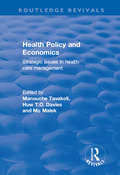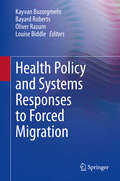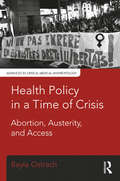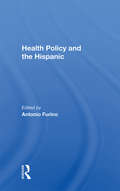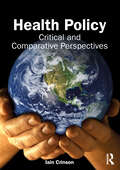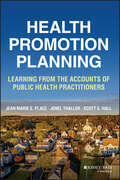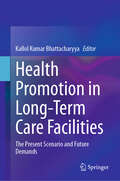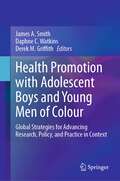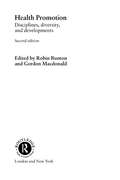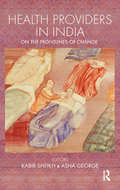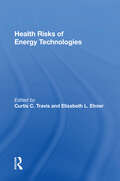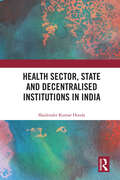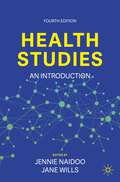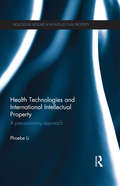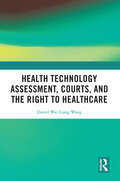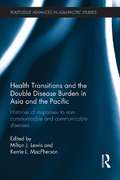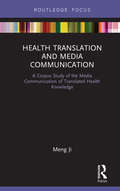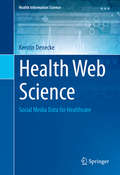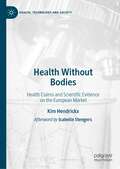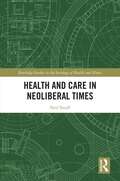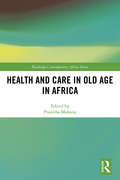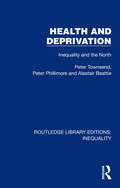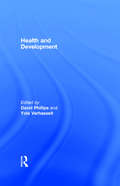- Table View
- List View
Health Policy and Economics: Strategic Issues in Health Care Management (Routledge Revivals)
by Mo Malek Manouche Tavakoli Huw T.o. DaviesThis title was first published in 2001: The papers in this volume, selected from nearly 100 submissions to the Fourth International Conference on Strategic Issues in Health Care Management, reflect the work taking place in health economics. The first five chapters in the collection examine the role of economics within clinical guidelines and suggest methods of improving the quality of economic evaluation which is now at the centre of decision-making in the NHS. The second section of the book is comprised of two papers on inequalities and access. The third part contains four papers, two of which cover reviews and tackle some theoretical issues regarding demand, and two are applied case studies. The fourth section assesses performance, and the final four papers review health reforms in a number of countries including the UK, Canada, France and Turkey.
Health Policy and Systems Responses to Forced Migration
by Oliver Razum Kayvan Bozorgmehr Bayard Roberts Louise BiddleForced migration has yet to be sufficiently addressed from the perspective of health policy and systems research, resulting in limited knowledge on system‐level interventions and policies to improve the health of forced migrants. The contributions within this edited volume seek to rectify this gap in the literature by compiling the existing knowledge on health systems and health policy responses to forced migration with a focus on asylum seekers, refugees, and internally displaced people. It also brings together the work of research communities from the fields of political science, epidemiology, health sciences, economics, psychology, and sociology to push the knowledge frontier of health research in the area of forced migration towards health policy and systems-level interventions, while also framing potential routes for further research in this area. Among the analyses within the chapters: The political economy of health and forced migration in EuropeInnovative humanitarian health financing for refugeesUnderstanding the resilience of health systemsHealth security in the context of forced migrationDiscrimination as a health systems response to forced migration Health Policy and Systems Responses to Forced Migration offers unique and interdisciplinary theoretical, empirical, and literature-based perspectives that apply a health policy and systems approach to health and healthcare challenges among forced migrants. It will find an engaged audience among policy makers and analysts, international organizations, scholars in academia, think tanks, and students in undergraduate programs or at the graduate level, for policy, practice, and educational purposes.
Health Policy in a Time of Crisis: Abortion, Austerity, and Access (Advances in Critical Medical Anthropology)
by Bayla OstrachHealth Policy in a Time of Crisis is a vivid ethnographic account of women and providers navigating the Catalan health system to obtain and provide publicly funded abortion care. Grounded in critical medical anthropology, the book situates access to publicly funded abortion care in the context of austerity and ongoing threats to recently liberalized laws, examining the actual levels of access in the region. In so doing, it examines the disparities experienced by immigrant and other women, documenting the diverse approaches adopted to overcome obstacles to care. Using accounts from both providers and women seeking care, Ostrach’s richly grounded analysis illuminates a healthcare system during a period of economic crisis and disagreement over reproductive governance. Researched against a backdrop of growing movements against austerity and for Catalan independence, the result is at once a study of true access to public health care in times of crisis and a compelling account of some women’s determination to go to any length to get the health care they need. Engagingly written, it will make interesting reading for scholars and students of anthropology and public health, as well as policymakers and the general reader concerned with the politics of abortion and public health.
Health Policy/spec Sale/avail Hard Only
by Antonio FurinoExploring the many dimensions of Hispanic health issues, this book updates interested readers with recent information and offers a view of the depth, scope, and complementarity of the challenges of providing adequate health care. Accordingly, the book is organized in four sections addressing, first, the conceptual, institutional, and policy element
Health Policy: Critical and Comparative Perspectives
by Iain CrinsonThis important new textbook provides comparative and critical analysis of health care policy from high-income countries in Europe to low-income developing countries in the Global South.It integrates conceptual themes drawn from the fields of sociology, policy analysis, and political science to offer a unique combination of theory, historical background, and wider social commentary. The book is divided into three sections: Section I establishes the conceptual basis for the analysis of the health policymaking process, including implementation. Section II provides an introduction to the key elements of conducting a comparative health system’s analysis, including chapters that provide examples of performance analysis in both high- and low-income developing countries. Section III examines key challenges now facing health policy-makers that include long-term social care provision, widening the scope of public health to address social inequalities in health outcome, the integration of genomic medicine within a health care system, and the establishment of an effective national pharmaceutical policy. Each chapter includes case studies, historical-institutional contexts, and summaries of key health policies. Detailed and clearly written, it is the ideal text for health and social science students in this expanding area of analysis.
Health Promotion Planning: Learning from the Accounts of Public Health Practitioners
by Jean Marie Place Jonel Thaller Scott S. HallHEALTH PROMOTION PLANNING “I find this book to be an invaluable resource, offering a comprehensive guide for assessing and addressing public health issues. Its unique blend of theoretical insights and real-world narratives provides a nuanced understanding of interventions in practical contexts. This book is an essential tool for both current and aspiring professionals in the public health sector.” —DANE MINNICK, Indiana Division of Mental Health and Addiction Real stories, real solutions—a unique textbook that embeds definitions and descriptions of program planning principles within the story of one town grappling with the opioid crisis In Health Promotion Planning: Learning from the Accounts of Public Health Practitioners, you will embark on a journey through the heart of a small midwestern city, where a community grapples with the daunting challenges of the opioid epidemic. The book uses narratives in a creative and engaging way, weaving together the real-life accounts of over 100 public health practitioners. As you follow the saga of the town, you will see program planning principles in action. Through the intricacies of substance use and opioid-related challenges, this book sheds light on the interconnected efforts of diverse programs, including needs assessment, health education curriculum, health communication campaigns, environmental change strategies, peer support initiatives, and community organizing. Students and practitioners will uncover the principles and processes of building health promotion programs. Discussion questions and activities at the end of each chapter stimulate reflection and exploration, offering a valuable resource for instructors and individual learners. Health Promotion Planning is a powerful glimpse into public health practice, inspiring future generations to take up the mantle in addressing societal challenges. Learners will witness health promotion in action as they follow the compelling stories inside—where lessons are learned, lives are changed, and hope emerges from the frontlines of a devastating epidemic.
Health Promotion in Long-Term Care Facilities: The Present Scenario and Future Demands
by Kallol Kumar BhattacharyyaThis book discusses biopsychosocial barriers and facilitators of long-term care services, focusing on health promotional activities targeted to maximize quality of life. This knowledge of meaningful activities helps to identify and improve strategies for supporting people living in long-term care facilities with various chronic disorders at a deeper level. Although no all-encompassing theory of caregiving has yet been developed, this book explores various theoretical formulations as central aspects of promoting health in long-term care practices. The current culture change in long-term care controls the well-being of the concerned person physically, psychologically, socially, and economically. In later life, these issues profoundly impact individuals' morbidity and lifespan. Further, it has been evidenced that the Centers for Medicare & Medicaid Services' five-star rating system that provides long-term care facilities&’ quality information to the public does not fully represent what matters to the residents from their perspectives. Resident satisfaction is an integral part of the quality of care; instead of clinical quality measures only, it is influenced by residents, their family members, staff, and administration. Person-centered care not only requires a 'culture change' in how residents and caregivers work together, but it also requires facilities to ensure staff deliver care with the highest possible level of empathy and adopt meaningful care practices. Among the topics covered in this contributed volume: Are Quality of Care and Quality of Life Synonymous in Long-Term Care? Aging-in-Place or Long-Term Care? Changing the Narrative to Promote Aging in Place in Long-Term Care Person-Centered Care and Culture Change Movement in Long-Term Care <span style="mso-farea
Health Promotion with Adolescent Boys and Young Men of Colour: Global Strategies for Advancing Research, Policy, and Practice in Context
by James A. Smith Derek M. Griffith Daphne C. WatkinsThis book highlights novel and pragmatic health promotion efforts being adopted with boys and young men of colour (BYMOC) globally that apply a strengths-based approach. Men's adoption of risky health practices and reluctance to seek help and engage in preventive health behaviours have frequently been used to explain their poorer health outcomes, particularly among adolescent boys and young men, and disproportionately affecting BYMOC. Emerging literature on equity and men's health has conveyed that intersections among age, race, sexuality, socioeconomic status and geography contribute to a complex array of health and social inequities. There is growing evidence to suggest these inequities shape the health practices of BYMOC. Unfortunately, these health and social inequities can have negative lifelong consequences. An increased focus on reducing health inequities has led to a greater focus on health promotion actions that address social and cultural determinants of health.The vulnerabilities that BYMOC face are diverse and are reflected in a range of tailored health promotion interventions. Health promotion approaches that influence structural and systemic inequities experienced by BYMOC have been a prominent feature. In this volume, the editors and contributors purposefully bring together international research and promising practice examples from Australia, the United States, New Zealand, and Canada to celebrate health promotion strategies that help to improve the health and social trajectories of BYMOC. In doing so, the book moves beyond discussing the health inequities faced by this population, to talk about the practical actions to address them in context. Health Promotion with Adolescent Boys and Young Men of Colour brings together diffuse strands of scholarship relating to male health promotion, gender/masculinities and health, equity and men's health, and gender and youth development. The book is a unique and useful resource for practitioners, policy-makers, researchers and students with an interest in health promotion/public health, social work/social policy, education, men's health, youth development, Indigenous studies, and health and social equity.
Health Promotion: Disciplines and Diversity
by Gordon Macdonald Robin BuntonHealth promotion is an increasingly central tenet in health professionals' lives. It has come into the public eye as the subject of party politics and policy, but where does the movement come from?This book brings together views from a range of subjects, some not always associated with health promotion, such as marketing or communication theory. Others, such as social policy of psychology may have obvious connections to make; here the implications for practice are discussed fully for the first time. The volume adds up to a timely reflection on the state of health promotion today and will provide practitioners and academics alike with a clearer undersanding of a discipline at the frontier of contemporary policy and practice.
Health Providers in India: On the Frontlines of Change
by Kabir Sheikh Asha GeorgeThis volume has articles contributed by health researchers, practitioners, policy advocates, programme managers and a journalist, and poems by renowned poet–physician Gieve Patel. Each presents a distinctive view of a particular group of frontline health providers, based on field research or on the authors’ respective experiences of working with or as providers. The health providers addressed in this volume include doctors (working in the public and private sectors), nurses, public health workers, counsellors, traditional practitioners and homecare providers. Different groups of health providers face struggles at diverse frontiers — social, professional and systemic. In the context of reforming health systems, government health workers must constantly negotiate the vagaries of changing working environments and policy vacillations. For traditional and homecare providers, formal health systems and structures often only reject and exclude their contributions. Medical doctors, conversely, face difficult challenges of introspection, as they tread the line between personal gain and public service. The ideas and themes that emerge in this collection not only contribute to the understanding of providers’ roles as actors in the health systems and societies of contemporary India, but re-examines preconceptions about this critical occupational group. This volume advances the case for a deeper appreciation of India’s complex landscape of healthcare provision, and of the potential roles of frontline health providers as central figures in development.
Health Rights Are Civil Rights: Peace and Justice Activism in Los Angeles, 1963–1978
by Jenna M. LoydHealth Rights Are Civil Rights tells the story of the important place of health in struggles for social change in Los Angeles in the 1960s and 1970s. Jenna M. Loyd describes how Black freedom, antiwar, welfare rights, and women&’s movement activists formed alliances to battle oppressive health systems and structural violence, working to establish the principle that health is a right. For a time—with President Nixon, big business, and organized labor in agreement on national health insurance—even universal health care seemed a real possibility.Health Rights Are Civil Rights documents what many Los Angeles activists recognized: that militarization was in part responsible for the inequalities in American cities. This challenging new reading of suburban white flight explores how racial conflicts transpired across a Southland landscape shaped by defense spending. While the war in Vietnam constrained social spending, the New Right gained strength by seizing on the racialized and gendered politics of urban crisis to resist urban reinvestment and social programs. Recapturing a little-known current of the era&’s activism, Loyd uses an intersectional approach to show why this diverse group of activists believed that democratic health care and ending war making were essential to create cities of freedom, peace, and social justice—a vision that goes unanswered still today.
Health Risks Of Energy Technologies
by Curtis TravisThis text examines occupational, public health, and environmental risks of the coal fuel cycle, the nuclear fuel cycle, and unconventional energy technologies. Includes detailed coverage of the relationship between energy economics and risk analysis, assessing the problems of applying traditional cost-benefit analysis to long-term environmental problems (such as global carbon dioxide levels), questions about the public's perception and acceptance of risk, global risks associated with current and proposed levels of energy production and consumption from all major sources.
Health Sector, State and Decentralised Institutions in India
by Shailender Kumar HoodaThis book describes the transition in Indian healthcare system since independence and contributes to the ongoing debate within development and institutional economics on the approaches towards reform in the public health system. The institutional reform perspective focuses on examining the effective utilisation of allotted resources and improvements in delivery through decentralisation in governance by ensuring higher participation of elected governments and local communities in politics, policymaking and delivery of health services. It discusses the economic (resource) reforms to explain the relevance and expansion of state interventionism along with its influence on the health sector, accountability and allocative efficiency. The author also explores the connections between neoliberal thought and privatisation in health sector, and examines the greater role of insurance-based financing and their implications for health service access and delivery. The book offers ways to address long-standing systemic and structural problems that confront the Indian healthcare system. Based on large-scale surveys and diverse empirical data on the Indian economy, this book will be of great interest to researchers, students and teachers of health economics, governance and institutional economics, political economy, sociology, public policy, regional studies and development studies. This will be useful to policymakers, health economists, social scientists, public health experts and professionals, and government and nongovernment institutions.
Health Studies: An Introduction
by Jane Wills Jennie NaidooThis new edition of Health Studies provides an authoritative and contemporary introduction to the study of health. With chapters including epidemiology, psychology, human and environmental geography, and anthropology, it is the only book to explore in one volume all of the core disciplines that contribute to understanding health. It illustrates how the complexity of health problems such as obesity should be viewed with an interdisciplinary perspective. Each chapter explains the disciplinary approach and then its theoretical and research approaches with examples. A highlight of this 4th edition is a new chapter on sports and exercise science providing another scientific chapter on physiology which is applied and will be of interest to all those thinking of employment in sports or leisure industry.The book is accessible and learner-centered and each chapter features: a connections feature that links the chapters together; learning tasks; questions for reflection and debate; examples to illustrate concepts, methodologies and to explore contemporary issues; a case study on obesity, food and diet.Comprehensive, accessible and written by leading experts in the different fields, this is the introductory text for all students of health studies.
Health Technologies and International Intellectual Property Law: A Precautionary Approach (Routledge Research in Intellectual Property)
by Phoebe LiThe global transmission of infectious diseases has fuelled the need for a more developed legal framework in international public health to provide prompt and specific guidance during a large-scale emergency. This book develops a means for States to take advantage of the flexibilities of compulsory licensing in the Agreement on Trade-Related Aspects of Intellectual Property Rights (TRIPS), which promotes access to medicines in a public health emergency. It presents the precautionary approach (PA) and the structure of risk analysis as a means to build a workable reading of TRIPS and to help States embody the flexibilities of intellectual property (IP). The work investigates the complementary roles of the World Health Organization (WHO) and the World Trade Organization (WTO) in order to promote the harmonisation of the precautionary approach in relation to the patenting of crucial pharmaceutical products. By bringing together international trade law and intellectual property law Phoebe Li demonstrates how through the use of risk analysis and the precautionary approach, States can still comply with their legal obligations in international law, while exercising their sovereignty right in issuing a compulsory licence of a drug patent in an uncertain public health emergency. This book will be of great interest to students and academics of medical and healthcare law, intellectual property law, international trade law, and human rights law.
Health Technology Assessment, Courts and the Right to Healthcare
by Daniel Wei WangBoth developing and developed countries face an increasing mismatch between what patients expect to receive from healthcare and what the public healthcare systems can afford to provide. Where there has been a growing recognition of the entitlement to receive healthcare, the frustrated expectations with regards to the level of provision has led to lawsuits challenging the denial of funding for health treatments by public health systems. This book analyses the impact of courts and litigation on the way health systems set priorities and make rationing decisions. In particular, it focuses on how the judicial protection of the right to healthcare can impact the institutionalization, functioning and centrality of Health Technology Assessment (HTA) for decisions about the funding of treatment. Based on the case study of three jurisdictions – Brazil, Colombia, and England – it shows that courts can be a key driver for the institutionalization of HTA. These case studies show the paradoxes of judicial control, which can promote accountability and impair it, demand administrative competence and undermine bureaucratic capacities. The case studies offer a nuanced and evidence-informed understanding of these paradoxes in the context of health care by showing how the judicial control of priority-setting decisions in health care can be used to require and control an explicit scheme for health technology assessment, but can also limit and circumvent it. It will be essential for those researching Medical Law and Healthcare Policy, Human Rights Law, and Social Rights.
Health Transitions and the Double Disease Burden in Asia and the Pacific: Histories of Responses to Non-Communicable and Communicable Diseases (Routledge Advances in Asia-Pacific Studies)
by Milton J. Lewis Kerrie L. MacPhersonChronic diseases—cardiovascular disease, cancer, chronic respiratory disease and diabetes—are not only the principal cause of world-wide mortality but also are now responsible for a striking increase in the percentage of sickness in developing countries still grappling with the acute problems of infectious diseases. This "double disease burden" poses demanding questions concerning the organisation of health care, allocation of scarce resources and strategies for disease prevention, control and treatment; and it threatens not only improvement in health status but economic development in the many poorer countries of the Asia Pacific region. This book presents an historical account of the development of the double disease burden in Asia and the Pacific, a region which has experienced great economic, social, demographic and political change. With in-depth analysis of more than fifteen countries, this volume examines the impact of the double disease burden on health care regimes, resource allocation, strategies for prevention and control on the wealthiest nations in the region, as well as the smallest Pacific islands. In doing so, the contributors to this book elaborate on the notion of the double disease burden as discussed by epidemiologists, and present real policy responses, whilst demonstrating how vital health is to economic development. Health Transitions and the Double Disease Burden in Asia and the Pacific will be of great value to both scholars and policy makers in the fields of public health, the history of medicine, as well as to those with a wider interest in the Asia-Pacific region.
Health Translation and Media Communication: A Corpus Study of the Media Communication of Translated Health Knowledge (Routledge Studies in Empirical Translation and Multilingual Communication)
by Meng JiCross-sectoral interaction and cooperation in the communication of nutritional health risks represents a strategic research area among national governments and international health authorities. The key research question this book addresses is whether and how different industrial sectors interact with each other in the communication and industrial utilisation of health research findings. Through the introduction and exploration of large-scale industry news and digital media resources, this book systematically analyses a range of digital news genres and identifies new and growing trends of inter-sectoral interaction around the communication of nutritional health in the Chinese language at both international and national levels. This book argues that cross-sectoral interaction can be explored to identify areas that require policy intervention to increase the efficiency and effectiveness of current health communication and promotion. Inter-sectoral interaction can also provide incentives to develop new social programmes and business models to innovate and transform traditional industrial sectors.
Health Web Science
by Kerstin DeneckeThis book introduces the field of Health Web Science and presents methods for information gathering from written social media data. It explores the availability and utility of the personal medical information shared on social media platforms and determines ways to apply this largely untapped information source to healthcare systems and public health monitoring. Introducing an innovative concept for integrating social media data with clinical data, it addresses the crucial aspect of combining experiential data from social media with clinical evidence, and explores how the variety of available social media content can be analyzed and implemented. The book tackles a range of topics including social media's role in healthcare, the gathering of shared information, and the integration of clinical and social media data. Application examples of social media for health monitoring, along with its usage in patient treatment are also provided. The book also considers the ethical and legal issues of gathering and utilizing social media data, along with the risks and challenges that must be considered when integrating social media data into healthcare choices. With an increased interest internationally in E-Health, Health 2. 0, Medicine 2. 0 and the recent birth of the discipline of Web Science, this book will be a valuable resource for researchers and practitioners investigating this emerging topic.
Health Without Bodies: Health Claims and Scientific Evidence on the European Market (Health, Technology and Society)
by Kim HendrickxHealth Without Bodies invites readers on an ethnographic exploration of the boundary between food and medicine. Food-related health claims are governed in the EU as voluntary statements on food labels to help consumers make ‘informed choices’. This poses an interesting problem: when claims refer to health, one can no longer ignore that consumers have bodies. Asking how these claims have become possible as a new kind of truth-statement on the market, this book reveals the contours of a fundamental tension between what is expected from consumers in a liberal market economy, and how food and the body come to trouble those expectations. In doing so, it illuminates why the difference between food and medicine is such a sensitive issue, and why seemingly trivial health claims have been subject to so much debate and political control.
Health and Care in Neoliberal Times
by NEIL SMALLThis book argues that neoliberal changes in health and social care go beyond resource allocations, priority setting and privatisation, and manifest in an invidious erosion of the quality of our social relationships, including relationships between care provider and care recipient. Critically examining the concept of culture and why shifts in what is considered "acceptable practice" happen, the book explores the conduct of conduct. It draws together what we know about neoliberalism’s impact on the economy and public services with research around governmentality and social change. Looking at breakdowns in the quality of care in the NHS and social care across a range of settings it holds that macro influences, such as austerity and marketisation, cannot explain everything and many of the damaging things that go on in care breakdowns occur in micro-interactions between care provider and care recipient. Analysing the interactions between the calculations of political centres, the strength of professional identities, the effectiveness of oversight and supervision and the biographies of protagonists, Neil Small problematises the focus on culture, and culture change, in our response to care failures and examines what a different approach to care might involve. Exploring the interaction of politics, economics and social change and their impact on health care and the wider welfare state, this is an important contribution for students and researchers in health and social care, sociology, political science and management studies.
Health and Care in Old Age in Africa (Routledge Contemporary Africa)
by Pranitha MaharajThis book explores health and care of the older population in Africa, focusing on policy and programmatic responses, gaps and future challenges related to health and care across the continent. The first part of the book sets the scene for the volume, profiling the demographic and health situation of the elderly in Africa. It also provides an overview of the various models of care in Africa, looking in particular at the family care model, which constitutes the main source of support for the elderly in Africa. Part 2 provides case studies from across the continent to explore varying forms of elder care as well as the health challenges facing the elderly in the different contexts. The final part considers key aspects related to older person’s experience of social pensions, which are widely recognised as a potentially powerful strategy of meeting the needs of older persons.. Identifying lessons regarding African-centric models of care, as well as reflections on the structural and policy challenges that are likely to confront countries across the continent as they strive to meet the specific needs of increasingly ageing populations, this book will be of interest to scholars of health and social care of the elderly.
Health and Deprivation: Inequality and the North (Routledge Library Editions: Inequality #8)
by Peter Phillimore Peter Townsend Alastair BeattieWhen originally published in 1988, this book presented new evidence of inequalities in health found among communities in different areas of the North of England. It relates this evidence to long-term trends taking place in patterns of health in Britain as a whole and explores how far health inequalities can be explained by variations in material deprivation. The book provides a detailed examination of the correlation between health and wealth, or ill-health and deprivation in Britain in the 20th century but the book has an enduring relevance as the Covid Pandemic has once again shown that regional disparities in wealth have profound outcomes for health. The book is of significance for health professionals, social services and those planner and politicians concerned with levelling up.
Health and Development (Longman Development Studies)
by David R. Phillips Yola VerhasseltHealth and Development presents a broad and detailed description of the multifaceted aspects of health and development across the globe. People are living longer, their lifestyles are changing and so too are the diseases from which they suffer. Recession in the North and debt servicing in the South have reduced public expenditure on health and welfare. The links between regional, economic and environmental factors and the health of a population are becoming clearer. Does development mean a longer life of lower quality? Always alive to both the global and the local implications, the authors focus in particular on the critical issues surrounding environmental impact, the interaction of poverty and health, socio-cultural factors in HIV/AIDS transmission, the use of traditional and community health care resources and women's health.
Health and Education in Early Childhood
by Arthur J. Reynolds Arthur J. Rolnick Judy A. Temple Arthur J. Reynolds Arthur J. RolnickHealth and Education in Early Childhood presents conceptual issues, research findings, and program and policy implications in promoting well-being in health and education in the first five years of life. Leading researchers in the multidisciplinary fields of early learning and human capital formation explore the themes of the integration of health and education in promoting young children's well-being; the timing of influences on child development; and the focus on multiple levels of strategies to promote healthy early development. Through this, a unique framework is provided to better understand how early childhood health and education predictors and interventions contribute to well-being at individual, family community, and societal levels and to policy development. Key topics addressed in the chapters include nutritional status, parenting, cognitive development and school readiness, conduct problems and antisocial behavior, obesity, and well-being in later childhood and adulthood.
